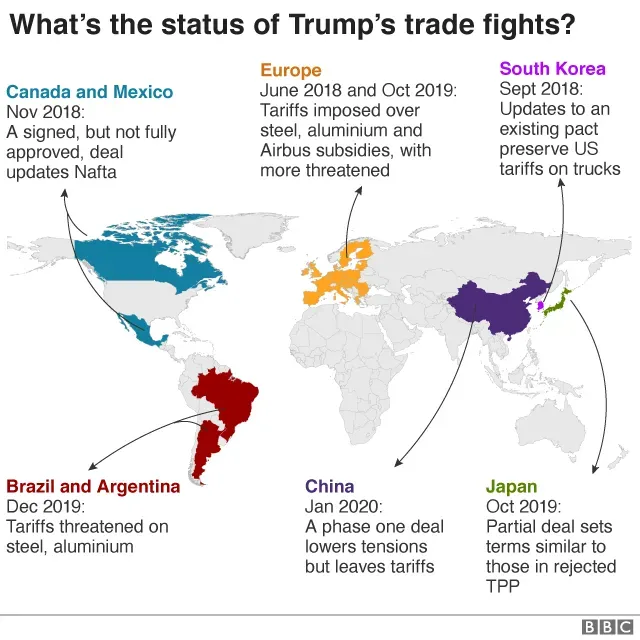The Trump tariff trade war has dramatically reshaped the landscape of international commerce, captivating public attention and igniting debates across economic spheres. By imposing tariffs on Chinese goods, President Trump aimed to revitalize American manufacturing and force corporations to relocate production back to the U.S. However, these bold economic decisions have not unfolded as he intended, leading to unforeseen repercussions for American retailers and consumers alike. Despite promises of job creation and increased domestic production, the complexities of the global trade system have revealed the challenges inherent in such unilateral measures. As tensions escalate, the implications of Trump’s tariffs extend far beyond the stock markets, shaking the foundations of trade relationships worldwide.
In recent years, the contentious trade disputes initiated by President Trump have drawn significant scrutiny from economists and business leaders. Characterized by hefty import tariffs on various products, particularly from China, these economic policies aim to bolster American interests in a rapidly evolving market. Yet, despite the administration’s intent to fortify the U.S. economy, many observers question whether this aggressive approach will yield the desired protections for domestic industries. The ongoing clash between the federal government and foreign markets has sparked discussions about the future of international trade dynamics and the emerging role of tariffs in shaping consumer behavior. As businesses navigate this evolving landscape, the consequences of such trade tactics continue to unfold, influencing both local economies and global supply chains.
Understanding Trump’s Economic Decisions
President Trump’s significant economic decisions have stirred ongoing debates among economists and political analysts. Early in his administration, he instituted tariffs on a variety of goods, claiming these would protect American jobs and encourage domestic production. However, his approach has raised concerns about potential negative repercussions for the global trade system, with critics pointing out that imposing tariffs can lead to retaliatory measures and increase costs for American consumers.
Moreover, his economic strategies have often been seen as reactionary, with decisions made in the heat of the moment rather than through comprehensive analysis. The recent retreats from his aggressive stance on the Federal Reserve and tariffs on Chinese goods illustrate a pattern of instability that can confuse both domestic businesses and international partners, reflecting a lack of solid economic policy and foresight.
Frequently Asked Questions
What are the implications of the Trump tariff trade war on American retailers?
The Trump tariff trade war has significantly impacted American retailers, leading to increased prices on imported goods. Major retailers like Target and Walmart have warned that the tariffs on Chinese goods could cause price hikes and potential shortages, affecting consumers. The ongoing trade conflict complicates supply chains, challenging the initial hopes that tariffs would compel companies to manufacture more products domestically.
How have Trump’s economic decisions influenced the current global trade system?
Trump’s economic decisions, specifically the imposition of tariffs on Chinese goods, have reshaped the global trade system. While the administration aimed to gain concessions from trading partners, the unpredictable nature of these tariffs has led to uncertainty. Many countries are reassessing their trade strategies in light of the U.S. stance, highlighting how significant economic decisions can cause ripples across international markets.
What role did the Federal Reserve play during the Trump tariff trade war?
During the Trump tariff trade war, the Federal Reserve played a crucial role in maintaining economic stability. Amid threats from President Trump to dismiss the Fed’s chairman, Treasury Secretary Scott Bessent emphasized the need for a careful approach to avoid escalating tensions. The Fed’s decisions regarding interest rates and economic policy were closely watched as they could directly influence market reactions to Trump’s tariffs.
Are Trump’s tariffs on Chinese goods effective in reshaping manufacturing in the U.S.?
The efficacy of Trump’s tariffs on Chinese goods in reshaping American manufacturing remains uncertain. While the President initially believed that high tariffs would force companies to shift production to the U.S., industry executives indicated that the complexity of supply chains would likely temper such outcomes. As companies weigh the costs of relocating versus the impact of tariffs, the anticipated manufacturing shift has not yet materialized.
How have Trump’s tariffs impacted consumer prices in the U.S.?
Trump’s tariffs have led to higher consumer prices in the U.S., particularly on goods imported from China. As retailers pass on increased costs from tariffs, consumers face rising prices for various products. This impact was highlighted by cautionary statements from major retailers, warning that tariffs could lead to empty shelves and elevated prices, illustrating a direct relationship between trade policy and consumer economics.
What long-term effects could the Trump tariff trade war have on U.S.-China relations?
The Trump tariff trade war has the potential to create long-term friction in U.S.-China relations. As tariffs continue to be a point of contention, trust between the nations may erode, complicating future trade negotiations. The hardline stance taken by Trump has led to retaliatory measures from China, which may exacerbate tensions and alter the dynamics of international trade for years to come.
What strategies have been suggested in response to the Trump tariff trade war challenges?
In response to the challenges of the Trump tariff trade war, various strategies have been suggested, including seeking multilateral agreements and fostering relationships with alternative trading partners. Experts recommend a comprehensive approach to trade policy that balances tariffs with diplomatic negotiations, aiming to mitigate the economic fallout while pursuing long-term advantages in the global trade system.
Could Trump’s tariff policies influence the Federal Reserve’s decisions?
Yes, Trump’s tariff policies could have a significant influence on the Federal Reserve’s decisions. The uncertainty and economic shifts created by tariffs may prompt the Fed to adjust its monetary policy to stabilize the economy. Decisions on interest rates and inflation management could be impacted by the ongoing effects of the trade war, as the Fed seeks to navigate these turbulent economic waters.
| Key Points | Details |
|---|---|
| Trump’s Tariffs Impact | Trump implemented tariffs aiming to compel companies to produce in the U.S., but effectiveness is uncertain. |
| Economic Consequences | Senior executives from major retailers warned that high tariffs would lead to increased consumer prices and shortages. |
| Political Adjustments | After escalating threats, Trump retreated, indicating recognition of complex global supply chains. |
| White House Narrative | The administration claims that Trump’s aggressive trade demands will eventually yield positive results, urging patience. |
Summary
The Trump tariff trade war exemplifies the challenges and unpredictability involved in modern economic policy. President Trump’s initial aggressive stance of imposing significant tariffs aimed at reshaping global trade dynamics has faced considerable backlash and adjustments. As economic realities set in, it has become evident that the anticipated outcomes may not materialize as expected, leading to economic strains for both American consumers and global supply chains. The ongoing developments in the Trump tariff trade war highlight the delicate balance between assertive trade policies and the intricate nature of global economics.



